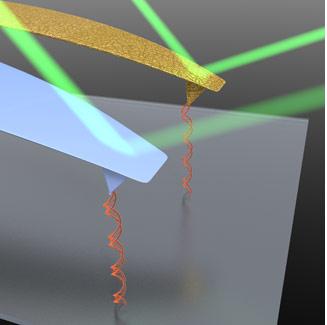Atomic Force Microscopes (AFM) are normally coated with gold to improve reflection of light. Researchers at JILA, the joint institute of National Institute of Standards and Technology (NIST) and the University of Colorado Boulder, stripped off the gold coating from the probe and found that stability and precision of measurements carried out in a liquid improved ten-fold. Liquid is the preferred medium for measurement in the field of biophysics where cells and DNA are kept immersed in liquid to replicate their natural environs.

Artitst's representation of AFM Probe with and without gold coating (Credit: Baxley/JILA)
The magnitude of forces measured at the molecular level are in the range of few PicoNewtons (pN). In a typical measurement, the cantilever-like probe of the AFM fastens to the molecule and pulls at it. The deflection caused by this pull is measured. Existing cantilevers are made of silicon with gold coated sides. It was during the study of folding and unfolding of protein molecules over periods of seconds to minutes that NIST physicist Thomas Perkins and his team discovered that the gold coating was responsible for the force drift. Perkins attributes this to the elastic property demonstrated by gold when employed in high-precision instruments. Bending the metal causes creep. In addition, gold’s mechanical properties are subject to change due to ageing, cracking of the metal and also due to molecules appending themselves to gold. Perkin’s team employed a chemical bath for removing the gold coating of the AFM cantilever. The result was a reduction in error margin for force measurements in liquids to 0.5 pN as opposed to 5 to 10 pN from gold coated probes.
The technique is applicable to any AFM measurement and the realized improvement in sensitivity pits AFM to the league of magnetic tweezers and optical traps.
Source: http://www.nist.gov
Disclaimer: The views expressed here are those of the author expressed in their private capacity and do not necessarily represent the views of AZoM.com Limited T/A AZoNetwork the owner and operator of this website. This disclaimer forms part of the Terms and conditions of use of this website.